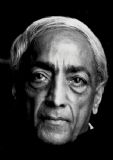When we think of enlightenment, Hollywood has projected something along the lines of an all-knowing, long-bearded, mystical sage or strict monk who could do near anything from this mythical enlightenment power.
It’s not as we would invision it in reality.
When talking of enlightenment, the Quaballa describes it as the “One thousand and one doors”. It is many things to many people, and there are numerous parts of enlightenment to be discussed.
For state of being, I’d like to show Jiddu Krishnamurti as an example.
Slight background information on Krishnamurti: Adopted by a Doctor at a young age by the Theosophical society, Krishnamurti was taught and cared for by the Theosophical society until he was 33. He was “foretold” to be an educator that would enlighten the world. He rejected the Theosophical Society, who raised him and returned all money and property given to him by the society. He grew into what he was “predestined” to be, out of not his education, but of his true self. Still, he became a world teacher and travelled for 60 years until his death talking of spiritual matters.
He talked of no set religion, but of a unified, singular spiritual experience. Something that transcended dogma. The only spark of the divine we have assuredly have: Consciousness.
In my other article, I discussed how we shape, or form our own realities. Here we will develop what your “enlightened” state “is”.
These questions are for oneself, and never need be spoken, in fact, experience the question if you will, overthinking fragments the experience.
Since you have created yourself, you have formed your identity, I will ask: What are you?
Foremost, you are a consciousness, knowing of yourself, your mind, your senses and your body. Secondly, a human being.
Now, Who are you?
You need not answer, but truly identify: Are you changing? If you are, then you must put your goals in sight and focus on them.
Are you static? If you are, then reflect on your accomplishments.
What of your ethics and your morals? See if they well-developed or all they are nonexistant.
Do you live for pleasure, or for duty? Reflect if you have satisifaction from your choice.
Meditate on these questions. You should atleast have a vague sense of your true belonging.

